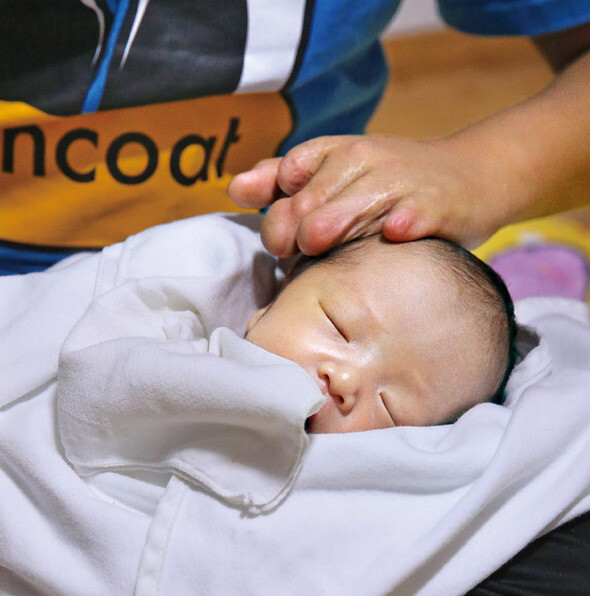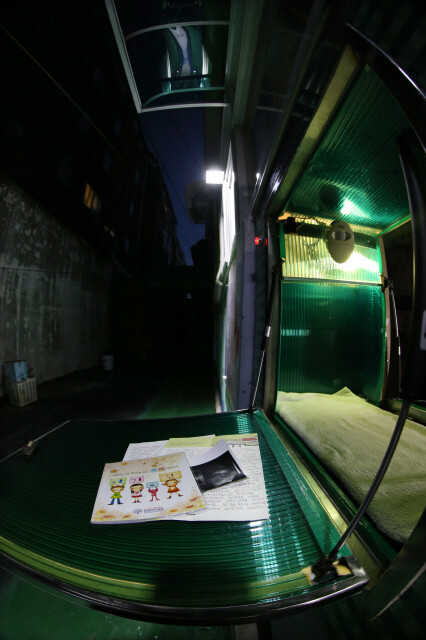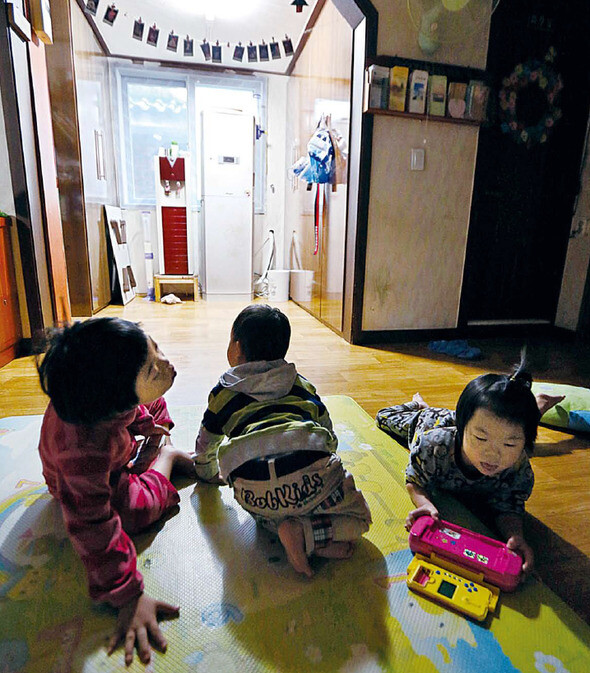hankyoreh
Links to other country sites 다른 나라 사이트 링크
[Reportage] ‘Baby box’ struggles with more abandoned newborns

By Kim Kyung-wook, Kim Hyo-jin and Park Su-ji, staff reporters
“What am I going to do?”
The 18-year-old mother kept repeating the words over and over, her body shaking. At her bosom, a newborn baby girl struggled to let out a cry, her body covered by gym clothes. Her body was splattered with amniotic fluid, the umbilical cord dangling down. Her lips were bright blue.
“She looks like she has hypothermia,” said the frantic pastor, 59-year-old Lee Jong-rak. “We need to bathe her in warm water right now.”
The missionary and volunteers at Jusarang Church took the baby from her mother’s arms. Lee carefully cut the cord.

It was around 4 pm on Oct. 31 that 18-year-old mother surnamed Kang showed up at the church in Seoul’s Nangok neighborhood with a baby in her arms. With her was her boyfriend, a young man around the same age. Kang, a high schooler in northern Gyeonggi Province, had given birth in her bathroom at home. As soon as the baby came out, she rushed to call her boyfriend. The couple and their newborn caught a taxi and raced to the church. There had been no time to bathe the baby.
Jusarang Church is home to the “baby box,” a kind of cradle for unwed mothers to deposit their children. The idea is to offer another option besides abandoning newborns on the side of the road - or taking their lives.
Kang came into the church with her baby rather than leaving it in the box. “It felt like I’d be throwing my baby in the garbage,” she explained. She kept her head down as she spoke.
Soon she was complaining of dizziness. She had lost a lot of blood delivering the child. One of the missionaries, 44-year-old Jeong Yeong-ran, prepared some seaweed soup for her, but Kang had trouble keeping it down.
“I should have told my parents, but I couldn’t,” Kang said. “I felt so ashamed, so sorry. I debated whether to do it, and finally. . . . I also thought about an abortion, but I could never do that.”
As her belly grew, she had begun wearing a maternity belt, she explained. She wore only baggy clothes at home and tried to avoid her parents. It was a terrifying time for the 18-year-old high school student.
After spending an hour or so talking to the young parents, Pastor Lee put his hands together in prayer. He asked that Kang be a mother who prayed for her baby even if the infant wasn’t with her, and for the baby to grow up loved. The sobbing that the young mother was keeping choked back began spilling out of her. The 18-year-old father sobbed silently, his head also hanging low. Darkness began creeping in outside the window. By the end of the day, the baby had been left behind.

More and more, children born unwanted through no fault of their own are ending up abandoned by their parents. According to yearly Ministry of Health and Welfare statistics on child abandonment, a total of 235 infants were abandoned in South Korea last year. The number rose from 202 in 2008 up to 222 in 2009 before dropping to 191 in 2010. The following year, it bounced back up to 218, with last year’s total continuing the upward trend.
The changes are attributed by Pastor Lee to the Special Adoption Law, which was enacted in August 2012, which enforced regulations stating that all babies’ births must to be officially registered before they can be put up for adoption.
Many times, the lives of children born to unwed mothers end almost as soon as the baby is born. Last March, a newborn died in Ulsan when its thirtysomething mother abandoned the baby in a gas station bathroom. In February, another infant was found buried alive by its mother on a hill in Gimhae.
This is why it is somewhat fortunate to find a baby in the baby box. Four days after Kang left, another child was abandoned at around 9:20 pm. It was right around the time the twenty children living at the church were going to bed. From the second-floor speaker, a bell rang out, signaling that someone had opened the box. Because the box is built into the church wall, people inside are notified when someone outside is opening it and putting a child inside. The minister and volunteers raced down to the second floor to find a baby wrapped in swaddling clothes. With it was a note bearing the words “10/29/2013, 5:00 pm” in purple. It was the date and time of the child’s birth. The baby, a mere line of birth information to its name, was left crying in an unfamiliar world.
The bell rang the next day too, and the day after. In the morning, in the evening, late at night when all the world was asleep, the bell kept ringing. In the twenty days between the Hankyoreh’s visit to the baby box on Oct. 31 and Nov. 19, a total of 18 child were left behind. Some were the children of unwed mothers in their teens and twenties, others had been abandoned by struggling parents, others were conceived through extramarital affairs, while others still had disabilities. In one case, a father came in with the baby after the unwed mother fled.
“Some of the abandoned children were the results of incest or rape,” said missionary Jeong Yeong-ran. “But the majority are born to unwed mothers in their teens. After that are unwed methods older than their teens, and then the ones from extramarital affairs.”
The babies don’t just come from Seoul. Children are brought there from all over the country. The baby box is only one of its kind in South Korea.
The abandoned children can expect next to nothing in support from the state. Private facilities take responsibility for collecting and supporting them, without any kind of government subsidies. The facilities depend on citizen support. Indeed, the government has asked for the baby box to be taken down. The argument is that it is an unlicensed facility that “encourages child abandonment.”
“Instead of demanding that we take down a facility to protect abandoned children and unwed mothers that the state doesn’t look after, what they ought to be doing is setting up their own child protection facilities and offering their own support to the mothers,” said Jeong.
The only government assistance currently available to unwed mothers is a child-rearing subsidy of 70,000 won (US$66) a month. Even that is an increase from what it was before - last August, it was raised after remaining at 50,000 won (US$47) for eight years. No recourse is available for when children are sick or injured. No unwed mother can afford to raise a child on government assistance without the help of her family or a private facility.
The government takes a hands-off approach to child protection facilities, which it calls a “local employment program.”
“Since 2005, social welfare programs like childcare that the state used to fund were given to local government to manage themselves,” explained an official with the Ministry of Health and Welfare, who spoke on condition of anonymity. “The central government can recommend that local government take steps for abandoned children, but it can’t force them.”
Local governments argue that the state’s double standard on child welfare is wreaking havoc. “It doesn’t make any sense for the state to fund things like daycare centers while telling the local government to take care of raising abandoned children by themselves,” said an official with Seoul Metropolitan Government, who spoke on condition of anonymity. “There need to be measures in place from the central government.”
Experts agreed that the problem urgently requires better sex education for young people and more support for unwed mothers. “If we want to reduce the number of abandoned children, we need to create an environment where unwed mothers can raise the babies themselves,” said Noh Hye-ryeon, a professor of social welfare studies at Soongsil University. “We need more economic and institutional support for unwed mothers.”
Jang Myeong-seon, a researcher at the Ewha Womans University Institute for Gender and Law, said systems like communal child care and social caregiving services need to be made available to allow unwed mothers to continue working or studying while raising their child.
Please direct questions or comments to [english@hani.co.kr]

Editorial・opinion
![[Column] Park Geun-hye déjà vu in Yoon Suk-yeol [Column] Park Geun-hye déjà vu in Yoon Suk-yeol](https://flexible.img.hani.co.kr/flexible/normal/500/300/imgdb/original/2024/0424/651713945113788.jpg) [Column] Park Geun-hye déjà vu in Yoon Suk-yeol
[Column] Park Geun-hye déjà vu in Yoon Suk-yeol![[Editorial] New weight of N. Korea’s nuclear threats makes dialogue all the more urgent [Editorial] New weight of N. Korea’s nuclear threats makes dialogue all the more urgent](https://flexible.img.hani.co.kr/flexible/normal/500/300/imgdb/original/2024/0424/7317139454662664.jpg) [Editorial] New weight of N. Korea’s nuclear threats makes dialogue all the more urgent
[Editorial] New weight of N. Korea’s nuclear threats makes dialogue all the more urgent- [Guest essay] The real reason Korea’s new right wants to dub Rhee a founding father
- [Column] ‘Choson’: Is it time we start referring to N. Korea in its own terms?
- [Editorial] Japan’s rewriting of history with Korea has gone too far
- [Column] The president’s questionable capacity for dialogue
- [Column] Are chaebol firms just pizza pies for families to divvy up as they please?
- [Column] Has Korea, too, crossed the Rubicon on China?
- [Correspondent’s column] In Japan’s alliance with US, echoes of its past alliances with UK
- [Editorial] Does Yoon think the Korean public is wrong?
Most viewed articles
- 1[Column] Park Geun-hye déjà vu in Yoon Suk-yeol
- 2Thursday to mark start of resignations by senior doctors amid standoff with government
- 3N. Korean hackers breached 10 defense contractors in South for months, police say
- 4[Editorial] New weight of N. Korea’s nuclear threats makes dialogue all the more urgent
- 5Will NewJeans end up collateral damage in internal feud at K-pop juggernaut Hybe?
- 6Kim Jong-un expressed ‘satisfaction’ with nuclear counterstrike drill directed at South
- 7[Editorial] Japan’s rewriting of history with Korea has gone too far
- 8[Column] ‘Choson’: Is it time we start referring to N. Korea in its own terms?
- 9[Cine feature] A new shift in the Korean film investment and distribution market
- 10[Column] The clock is ticking for Korea’s first lady